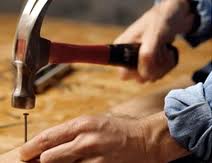I recently received a question asking, “My background is not in the building trades. How do I learn the required skills to start a business in repairing houses and renting them out?”
In terms of how to learn to repair houses, I will answer that question in two parts. The first part today, and the second half of my answer will be in a subsequent blog article.
How to learn the appropriate skills:
1. Learn by doing. When Orson Wells directed his first movie, “Citizen Kane,” he said that he felt “like a kid with a giant train set.” One nice thing about buying a fix-up house is that it’s like having giant practice house, where you can practice learning to do repairs. Since the house is already pretty well beat up, its OK if you make a few mistakes along the way. You can always go back and correct them later.
My philosophy is that the best way to learn is by doing. Granted, you have to gradually work your way up, if your are beginning near the bottom. At first you will have to hire out for most of the moderate or difficult repairs. Make sure you watch, or assist in doing, the repair when you pay someone to do it. That way you can do it, or at least do part of it, the next time you encounter the same situation.
Just last week, I had to hire someone to repair my air conditioner in a house that I am living in and fixing up at the same time. I took time off my 9-5:00 job to be on the roof with the repairman and observe what he was doing. I saw all of the tests that he performed with the multi-tester to identify what was wrong. The problem turned out to be two capacitors that were blown. If a similar problem arises in the future, I will know how to check and replace the capacitors myself.
If you have to pay someone to make a repair for you, make sure that you get your money’s worth by watching the repairman, and learning how to do it yourself.
2. Take community college classes. Most community colleges offer courses in the building trades – plumbing, electrical wiring, air conditioning and furnace repair, and woodworking. For a fairly low price, you can learn how to make repairs like a pro by taking these classes. I have taken several classes and they have been well worth the investment of time and money. Besides leaning the skills in a supervised environment, you also learn how to use the correct tools in the proper manner. As part of the program, students are required to take an 8-hour OSHA course in how to be aware of work site dangers, to do work in a safe way, and to avoid accidents. I highly recommend that anyone who does repair work take the OSHA class.
Share this: del.icio.us | Digg | Ma.gnolia | Reddit | Stumble Upon |








